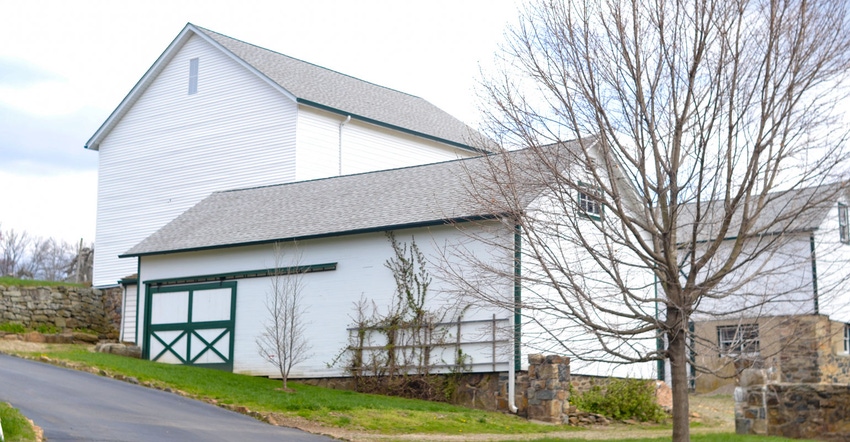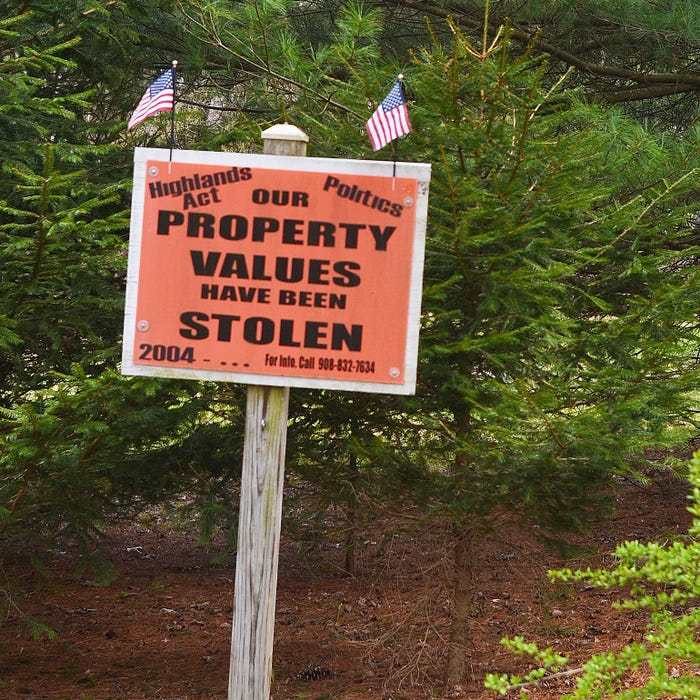April 21, 2020

In 2004, the Highlands Act established preservation and planning areas in the Northwest corner of New Jersey. The act’s stated purpose was to limit development to maintain water quality in the part of the state that provides water for a vast area to the south and east.
Agriculture is the largest industry in the region and was identified by the state Legislature in crafting the Highlands Act as needing singular care and enhancement.
But many farmers say they have seen no evidence of that.
Hank Klumpp, who farms 150 acres in northern Hunterdon County, spoke at a recent meeting of the Highlands Council, the state agency that governs the region. He reminded the council that Charlie Kuperas, former state secretary of agriculture, told farmers that as long as they could farm they would be fine.
However, “we lost our equity,” Klumpp said.
He has a sign on his property that reads, “Our Property Values Have Been Stolen.”
When the Highlands Act restricted development in the region, land that could no longer be developed lost value. Farmers could no longer borrow as much against their land or, in some cases, borrow anything at all.
Dave Shrope farms hayfields in Lebanon Township on 58 acres that he owns. Before the Highlands Act, he said that he could have subdivided the land into seven lots and sold them for $200,000 each, if not more. Now, because he can no longer subdivide, his land is worth about $3,000 an acre. This drops the total value of his property from more than $1 million to about $300,000. He said most of that value is in his house and outbuildings.
Even if the land could be subdivided, Highlands Act regulations call for a minimum 25 acres for one septic system on open land and 88 acres on woodland, Shrope said.
He borrowed money when he first bought his farm in 1975 to fix up barns that were in danger of collapse, and a second time several years later. Now, he doesn’t have enough equity to borrow if he needs to.
Deborah Post, who grows apples in Chester Township, said the Highlands Act reduced the value of her land by 30%.
Many farmers borrow through Farm Credit East in Clinton Township. John Cooper, an appraiser with Farm Credit East, said the exact amount of equity loss is “not something we track.” He explained that the Multiple Listing Service used by realtors does not track the value of large pieces of land.
Jane TenEyck, a real estate agent in Hunterdon County, declined to comment on farm property value.
Establishment of the Act
The Highlands Region has 110,000 acres of farmland in portions of seven counties. There are also many farms in the non-Highlands portions of the counties, especially Sussex, Warren, Hunterdon and Morris. Much of the farmland is preserved under State Agricultural Development Committee standards.
According to the Highlands Regional Master Plan (RMP) Monitoring Program Recommendation Report, the RMP focuses on “both the preservation of agricultural lands and the support of agriculture as an industry … objectives are designed to preserve lands for farm operations, protect and strengthen agriculture as an industry, and provide incentives and funding opportunities to encourage best management processes that protect and enhance the resources of the Highlands Region.”
The plan, established Aug. 10, 2004, also called for the establishment of an agricultural advisory committee. The committee was finally established at the Feb. 20 meeting of the council at the behest of Kurt Alstede, vice chairman and a Chester farmer.
The resolution establishing the committee called for it to “advise the Highlands Council on potential ways to assist and strengthen the Highlands Region agricultural community to ensure sustained economic viability by identifying and responding to trends and challenges affecting the agricultural business.”
Up to seven council members will make up the committee. The March Highlands Council meeting was canceled because of the COVID-19 pandemic, so members of the committee have not been appointed.
At present, Alstede and member Richard Vohden of Green Township are the only farmers on the 12-member Highlands Council.
Protecting water?
Former Gov. Jim McGreevy was the driving force behind the Highlands Act. He created a task force on Sept. 19, 2003, with a mandate to recommend how to best advance conservation efforts, smart growth, regional planning and water resource protection in a region that encompasses parts of seven counties and is home to large reservoirs and potable groundwater.
The task force created the Highlands Water Protection and Planning Council to develop a regional master plan. The thought at the time was that by putting in conservation practices on farms and other open land it would be cheaper than treating water at a plant for downstream use.
Shrope, though, believes that it is a myth that the Highlands Act was enacted to protect water. He points out that most of the development in the Highlands is on wells and septic systems, which return 70% of the water back to the land.
 LOST VALUES: Hank Klumpp, who farms 150 acres in Tewksbury Township, has had this sign on his farm since 2004.
LOST VALUES: Hank Klumpp, who farms 150 acres in Tewksbury Township, has had this sign on his farm since 2004.

Klumpp said at the February meeting that he hoped the agriculture committee could find a way to compensate farmers for what they have lost.
“Most farmers will take installments,” Klumpp told the council, reminding them that “when you lose equity, you can’t borrow anything.”
Post nominated herself to be part of the agriculture committee, reminding the council that her Riamede Farm in Chester Township is the largest female-owned-and-operated farm in New Jersey.
In a later interview, she said that farmers’ assets are in their land, and described the concept of using land to store the value of your assets as “Econ 101, first chapter.” Post is a graduate of Harvard Business School.
Lebanon Township farmer Sharon Hardy, who boards and raises horses, said she has seen several boom-bust cycles in her 30 years on the farm. While she agrees that the Highlands Act is a negative for farmers who need to borrow against their land or for anyone who wanted to subdivide their property, it also has preserved the rural character and country vistas in Lebanon Township, of which 99% is in preservation area.
Primerano writes from New Jersey.
You May Also Like




